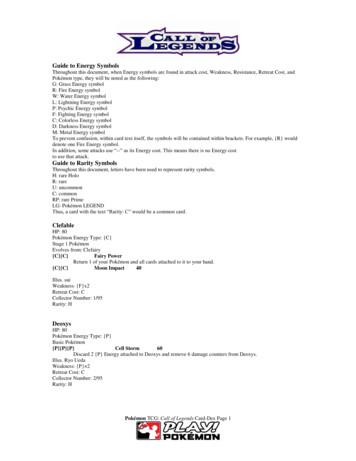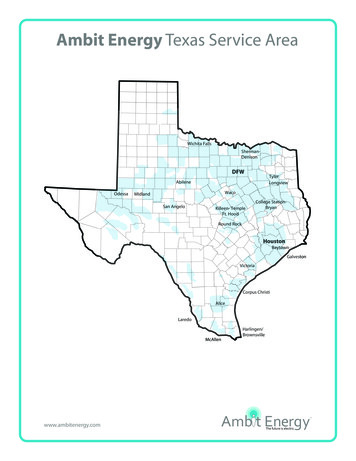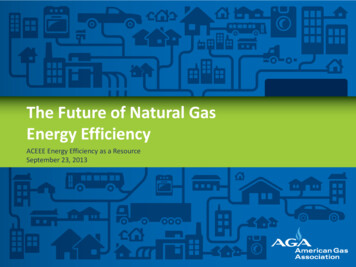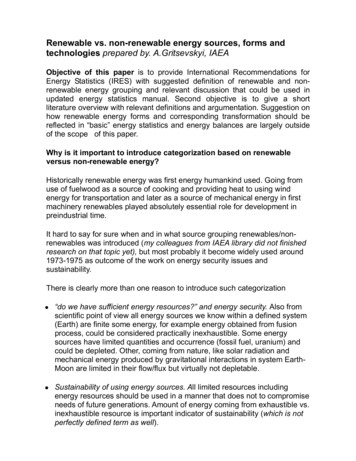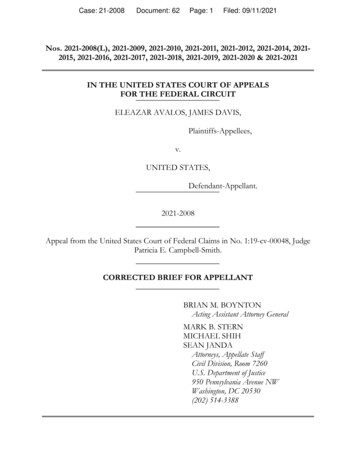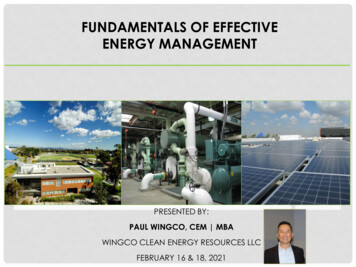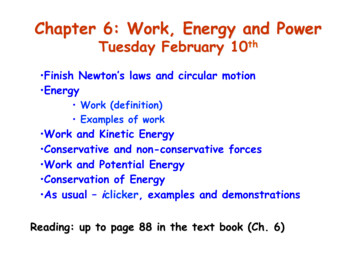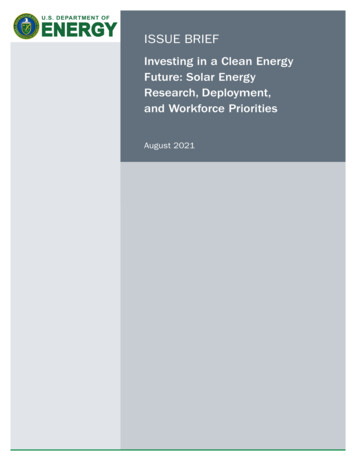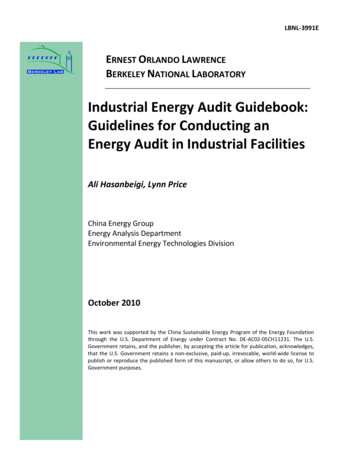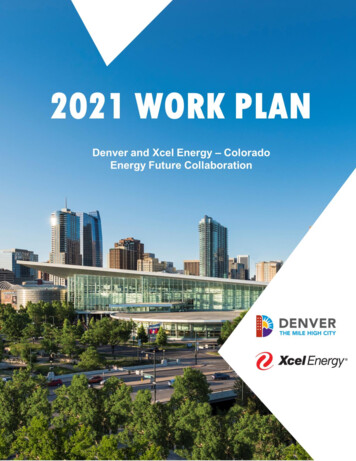
Transcription
2021 Work Plan – Energy Future Collaboration between the City and County of Denver and Xcel Energy1
2021 Work Plan – Energy Future Collaboration between the City and County of Denver and Xcel EnergyBACKGROUNDOn February 28, 2018, the City and County of Denver, Colorado (“Denver”) and Public Service Company of Colorado, aColorado corporation and an Xcel Energy company (“Xcel Energy”), entered into an Energy Future Collaboration Memorandum of Understanding, as amended from time-to-time (“MOU”). For Denver and Xcel Energy, the MOU provides astrategy and framework for cooperation and achievement of a shared vision through broad collaboration, focusing oninnovation, clean energy, economic development opportunities, customer choice programs and technology – known as theEnergy Future Collaboration Partnership (“EFC Partnership”).In August 2020, Denver and Xcel Energy amended the MOU to clarify the role of the Denver International Airport (“DEN”) inthe EFC Partnership by providing a list of DEN-focused projects for illustrative consideration. The amended MOU is attachedand incorporated into this Work Plan as Exhibit A. Section 4.1 of the MOU contemplates that upon execution of the MOU, theParties will develop a plan to advance the EFC Partnership, which is this Work Plan for 2020. Denver and DEN are collectivelyreferred to as Denver or the City, unless specifically stated otherwise. Denver and Xcel Energy are collectively called the“Parties” in this Work Plan.This Work Plan details the governance structure and anticipated deliverables under the EFC Partnership for 2020 and followsthe guiding principles in the MOU (see Section 3 of the MOU). Exhibit B to the Work Plan outlines the Parties’ planned EFCPartnership governance structure. The structure includes an “Executive Group,” “Core Team,” and “Technical Team(s)” all asdefined in Exhibit B and as summarized below.Group LevelExecutive Group(Leadership representingall EFC Parties)Core Team(Primarily working groupleads)TechnicalWorking Groups(Subject matter experts)Functions1. Promote and ensure consistent communication throughout the hierarchies of Denver andXcel Energy.2. As appropriate, provide additional guidance or review policies that require a formalprocess with the Core Team.1. Support the Technical Working Groups.2. Keep the Executive Group informed.3. Encourage knowledge sharing and collaboration.1. Establish a clear purpose for each group as it relates to a city-wide climate/clean energyobjective.2. Implement strategies towards measurable near-term goals.3. Topic-specific knowledge sharing and collaboration.Michael B. HancockMayor, City andCounty of DenverAlice K. JacksonPresident, Public ServiceCompany of Colorado2
2021 Work Plan – Energy Future Collaboration between the City and County of Denver and Xcel EnergyThis is not a legal or binding governance structure, but rather provides a framework and process for how the Parties envisionthe large and diverse organizations they represent interacting together to successfully identify and implement EFCPartnership projects. In prioritizing the items to be performed in this Work Plan, the Parties have considered their sharedvision in the MOU as well as regulatory requirements in Colorado. Recognizing the new nature of the EFC Partnership, theParties are focused on building a track record and gaining greater experience for this collaboration. Considering this, Denverand Xcel Energy have outlined short-term and longer-term goals, organized by six technical working groups as follows.Technical Working GroupPurpose1.Lead engagement in policy and regulatory activities.Ensure that 100 percent of electricity use community-wide contributes to acarbon-free electric grid by 2030.Renewable Electricity, Policy, andRegulatoryImplementation Project #1.1 – Municipally Hosted Community Solar Gardens#1.2 – Establishment of Solar Storage Program Options through the Public Utilities Commission2.Strategic ElectrificationStudy and implement strategies to decarbonize all buildings and homes inDenver.Reduce heating emissions by 25% in residential buildings and homes, and 50%in commercial buildings by 2040.Implementation Project #2.1 – Complete Denver’s Building Decarbonization Planning Efforts#2.2 – Promote Incentives for Fuel Switching from Natural Gas to Electric Appliances3.Resilience and ReliabilityCollaborate on opportunities to enhance the resilience and reliability of criticalinfrastructure in Denver.Implementation Project #3.1 – Community Resiliency Initiative Projects#3.2 – Pursue Grant Funding for Renewable Energy Storage Microgrids at Critical Facilities4.Municipal OperationsImplement CCD’s municipal facility strategic energy plan.Ensure that 100 percent of electricity use at municipal buildings contributes toa carbon-free electric grid by 2025.Implementation Project #4 – Decarbonization of Municipal Facilities5.StreetlightsConvert streetlights to LEDs community-wide for Denver.Implementation Project #5 – LED Streetlight Conversions6.Electric VehiclesAchieve a clean, carbon-free transportation system that improves the healthand livability of our communities.Drive efforts towards the 2030 target that 30 percent of all vehicle registrationsin Denver are electric vehicles.Implementation Project #6 – Make Ready Support for City Charging StationsThe Parties have other day-to-day dealings that will continue to occur in their course and not as part of this Work Plan.Additionally, the Parties recognize that this is an iterative process and the Parties may need to update and modify this WorkPlan from time to time.Denver will seek to implement EFC Partnership projects values at strategic locations and across Denver agencies and offices.These include, but are not limited to, Denver’s municipal facilities, DEN, the National Western Center, and the DenverArapahoe Disposal Site. Representatives across Denver’s municipal agencies and offices will participate in the EFC Partnershipas necessary to achieve its goals.3
2021 Work Plan – Energy Future Collaboration between the City and County of Denver and Xcel Energy1. Renewable Electricity, Policy, and Regulatory (REPR)Objective #1.1: Enable Denver to achieve its 80x50 Climate ActionPlan goal that 100 percent of electricity use community-widecontributes to a carbon-free electric grid by 2030. DecarbonizingDenver’s electric grid can be accomplished through Xcel’s grid mix,deployment of distributed resources, and community participation inrenewable programs.Long-term vision and ongoing support activitiesA. Increase access to and encourage community participation involuntary renewable programs.B. Pursue opportunities for municipally backed renewableenergy projects that empower Denver residents andbusinesses with access to reliable and affordable electricity.C. Evaluate policy strategies from other jurisdictions that couldhelp to incentivize investment in local renewable electricitygeneration and energy storage systems.Objective #1.2: Act as a knowledge resource and lead, organize, or support policy and regulatory activities for the EFCPartnership. The Parties will seek areas of mutual alignment regarding policy matters such as support for statutoryrecognition of the principles in the EFC Partnership.Long-term vision and ongoing support activitiesA. Denver will be provided with more information about Xcel Energy’s regulatory and resource planning process andrequirements.B. Xcel Energy will be provided with more information about how Denver views these processes and how they relate toDenver’s priorities and objectives through the EFC Partnership.C. Denver will participate in regulatory proceedings to promote a rapid and equitable decarbonization of the Coloradogrid mix.2021 Implementation ProjectsProject #1.1: Municipally Hosted Community SolarDenver will continue to advance the Renewable DenverCommunity Solar initiative to host community-solar projectson municipal property. In this approach, the power will beshared between the City’s municipal facilities and low- andmoderate-income households. Additionally, the programenables the deployment of highly visible projects acrossDenver, workforce training, expanded access to energysupport services for income-qualified households; and apartnership with the Denver Public Schools to engagestudents. Denver will pursue community solar capacitythrough Xcel Energy’s Solar*Rewards Community (S*RC)program offerings. Denver will recommend changes to theS*RC program through stakeholder meetings and at PUC toincrease the program’s emphasis on community benefits.Project #1.2: Establishment of Solar Storage ProgramsDenver and Xcel Energy will collaborate towards theestablishment of a significant solar storage program asencouraged by Commission decision No. C20-0749. Denverwill work with Xcel Energy to build stakeholder consensusfor a program or programs that may be presented to theCommission for approval individually or as part of anotherupcoming proceeding, such as the Clean Energy Plan.2020 Progress UpdateProgress on Objective #1.1Denver released its 100% Renewable Electricity ActionPlan in August 2020 (www.denvergov.org/solar). Keypriorities include maximizing investments in localrenewable energy sources and ensuring that energyinvestments produce co-benefits such as workforcedevelopment, bill savings, and resilience. The followingmetrics track Denver’s progress: System Renewables 20.7% (2019) Distributed Solar 1.2% (2019) Utility-Scale RE Subscriptions 0.8% (2019)Progress on Objective #1.2Denver filed comments in more than a dozenproceedings at the PUC to advance its objectives.2020 Project #1: Municipally Hosted Community SolarThe Renewable Denver Initiative strives to makerenewable electricity more accessible to low- andmoderate-income members of the community andenabling energy cost savings. Denver was selected toreceive a 1 million grant award from the ColoradoDepartment of Local Affairs.4
2021 Work Plan – Energy Future Collaboration between the City and County of Denver and Xcel Energy2. Strategic ElectrificationObjective #2.1: Study and implement strategies to decarbonize allbuildings and homes in Denver. The group is working towardsDenver’s 80x50 Climate Action Plan goal to reduce greenhousegas emissions from heating by 25% in residential buildings andhomes, and 50% in commercial buildings by the year 2040. Thegroup is also studying how Denver could achieve carbon neutralityin buildings and homes by 2050 to align with the latest scienceand recommendations from the Intergovernmental Panel onClimate Change (IPCC).Today nearly all our buildings and homes are heated with naturalgas. This results in greenhouse gas emissions from carbon dioxidevia on-site combustion and fugitive methane emissions upstream.Strategic electrification of buildings is one potential option fordecarbonizing heating energy as we move to a 100% renewableelectricity grid. The group is studying the most cost-effectiveoptions for building decarbonization in Denver including, but notlimited to electrification, energy efficiency, storage, renewables,grid interactive systems, and other new technologies.Longer-term and ongoing support activities:A. Educate the community regarding the importance and opportunities that building electrification represents.B. Collaborate on the opportunity to evaluate if electrification is an option as Xcel Energy conducts steam systemengineering studies and develops transition plans for buildings.C. Partner to shape workforce training programs on heat pumps.D. Partner to ensure Xcel Energy’s Energy Design Assistance program complements Denver’s stretch/green code andother climate goals.2021 Implementation ProjectsProject #2.1: Complete Denver’s BuildingDecarbonization Planning EffortsThe Strategic Electrification Working Group willcomplete the Existing Building Strategic Electrificationand Net Zero Energy New Buildings & HomesImplementation Plans. The plans will assist in passingnew code every three years, creating clean energy jobs,driving economic recovery and improving energyequity. Net zero energy in Denver means that a buildingis highly energy efficient, all-electric, powered by 100%renewable energy and electricity, and provides demandflexibility to the grid.Project #2.2: Promote Incentives for Fuel Switchingfrom Natural Gas to Electric AppliancesDenver and Xcel Energy will share data and analysispertaining to the electrification of space and waterheating and other appliances. The outcomes of thebeneficial electrification programs proposed in the2021/2022 DSM Plan (20A-0287EG) will be evaluatedand used to inform program changes (via 60/90 DayNotice) and to build stakeholder support forelectrification objectives in the next DSM StrategicIssues proceeding (anticipated in 2022).2020 Progress UpdateProgress on Objective #2.1Denver has been working with Xcel Energy and several otherpartners toward the release of its Existing Building StrategicElectrification Implementation Plan.Denver is working concurrently on a Net Zero Energy NewBuildings & Homes Implementation Plan.2020 Project #2.2: Collaborate on Denver’s Existing BuildingStrategic Electrification Implementation PlanThe Implementation Plan will create a clearly defined, stepby-step plan for how to decarbonize Denver’s existinghomes and buildings by reducing heating emissions by 25%in residential buildings and homes, and 50% in commercialbuildings by the year 2040, and 100% by 2050.Xcel Energy provided data to inform the load curve analysisand peak heating needs in Denver and worked with theImplementation Plan team on the analysis to ensure theplan finds the lowest cost path to decarbonization.2020 Project #2.2: Collaborate to understand incentives forfuel switching from natural gas to electric heatDenver participated in proceeding 20A-0287EG, the 20212022 Demand Side Management Plan. Xcel Energy hasrequested a variance to allow for fuel switching incentives.5
2021 Work Plan – Energy Future Collaboration between the City and County of Denver and Xcel Energy3. Resiliency and ReliabilityObjective #3.1: Collaborate on opportunities to enhance theresilience and reliability of critical infrastructure in Denver.Longer-term and ongoing support activities:A. Develop inventory of critical infrastructure androadmap to enhance resiliency and reliability.Establish a framework to evaluate and prioritizeenergy resiliency and reliability projects. Createimplementation roadmap for highest priorityopportunities.B. Collaborate to develop new solutions/programs toreduce the frequency and severity of powerdisruptions to critical infrastructure in Denver (i.e.accelerated undergrounding of electric distributionfacilities under the Franchise Agreement, improvedcoordination on construction projects, annualdevelopment of a rolling three-year program todiscuss critical needs and system upgrades, andnatural disaster preparedness planning thataddresses resilient infrastructure), as appropriate.2020 Progress UpdateProgress on Objective #3.1Denver’s Hazard Mitigation Plan was approved by theFederal Emergency Management Agency (FEMA) onMay 2017 and adopted by Denver in Executive OrderNo. 85B. Denver’s Office of Emergency Managementcontinues to update the City’s programs to provide forContinuity of Government (COG), Continuity ofOperations (COOP), Business Continuity, and CriticalInfrastructure Protection (CIP).2020 Project #3: Community Resiliency Initiative ProjectsDecision No. R20-0732 approved Xcel Energy’sCommunity Resiliency Initiative, which consist of sevenenergy storage micro-grid projects totalingapproximately 6 MW and 15 MWh of capacity. Twoprojects submitted by Denver were selected: Denver International Airport AutomatedGuideway Transit System (2MW/4MWh) National Western Center (2MW/4MWh)2021 Implementation ProjectsProject #3.1: Community Resiliency Initiative ProjectsDEN and the National Western Center will work with Xcel Energy to implement the Community Resiliency Initiative energystorage micro-grid projects. The Denver International Airport AGTS is the primary means to move passengers between the main terminal andthe airport’s three main concourses. Even a short disruption to AGTS’s electrical service can cause delays at one ofthe busiest airports in our nation — impacting in the process DEN’s ability to continue aircraft operations, provideadequate care and services, and evacuate passengers from areas that pose dangers to health and safety. The National Western Center is a multi-building and multi-purpose campus currently under construction innortheast Denver. In addition to hosting regional and national events, the National Western Center is planned to bea hub for emergency management purposes — as its indoor and surrounding outdoor spaces are ideal for a varietyof emergency management needs (e.g., food distribution, medical services, sleeping quarters, etc.).Project #3.2. Pursue Grant Funding for Renewable Energy Storage Microgrids at Critical FacilitiesDenver and Xcel Energy will collaborate to research and evaluate potential grant programs to support the deployment ofrenewable energy storage microgrid projects at key City facilities, including but not limited to the National Western Center,Colorado Convention Center, and Denver International Airport. Microgrid projects will (1) provide reliable back-up power inthe event of a grid outage, enabling the City to continue providing essential service to the community during an emergency,and (2) provide grid benefit during normal operation. The workgroup will review project scopes, develop a grant strategy,and coordinate a multi-agency grant application for the 2021 grant cycle.6
2021 Work Plan – Energy Future Collaboration between the City and County of Denver and Xcel Energy4. Municipal OperationsObjective #4.1: Implement Denver’s municipal facilitystrategic energy plan. The group is specifically working onhow Denver can achieve its 80x50 Climate Action Plan goalthat 100 percent of electricity use at municipal buildingscontributes to a carbon-free electric grid by 2025.Longer-term and ongoing support activities:A. The Parties will collaborate on an engineeringstudy and a regulatory and resource plan for XcelEnergy’s steam business (19AL-01231ST).B. Support the Resiliency and Reliability workinggroup on relevant initiatives that may includeaccelerated undergrounding of electric distributionfacilities, improved coordination on constructionprojects, and annual development of a rollingprogram to discuss critical needs and systemupgrades, as appropriate.2021 Implementation ProjectProject #4: Decarbonization of Municipal FacilitiesDenver and DEN will continue work to implement costeffective energy conservation measures as part of ongoingenergy performance contracts. These opportunities includebut are not limited to energy efficiency savings and thedeployment of on-site solar generation.2020 Progress UpdateProgress on Objective #4.1Denver has been working with Xcel Energy to conductbuilding walkthroughs in support of the engineeringstudy and resource plan for the steam business. Areport is due to the PUC on or before May 1, 2022Denver released a public dashboard to track progresson its municipal renewable electricity target. As of2019, Denver was at 18% of its goal of having 256municipal buildings powered by 100% renewableelectricity by 2025.2020 Project #4: Decarbonization of Municipal FacilitiesDenver and DEN completed investment grade energyaudits across their respective facility portfolios as partof energy performance contracts. The audits havegenerated a list of possible energy conservationmeasures that Denver and DEN are evaluating andconsidering for investment.Denver’s municipal facilities and DEN were integral tothe advancement of the Renewable Denver CommunitySolar Initiative, contributing to activities including butnot limited to solar developer selection, site evaluation,community programing design, and the application toXcel Energy’s 2020 Community Solar RFP.Denver’s municipal facilities are also supporting strategies and contributing to efforts to ensure that 100 percent of electricityuse at municipal buildings contributes to a carbon-free electric grid by 2025. This includes supporting the Renewable DenverInitiative (i.e., hosting and subscribing to local community solar gardens) and working with Xcel Energy to leveragemunicipally hosted distributed energy resources to support demand flexibility and grid management. Denver (excluding DEN)participates in Xcel Energy’s Partners in Energy (“PIE”) program.7
2021 Work Plan – Energy Future Collaboration between the City and County of Denver and Xcel Energy5. StreetlightsObjective #5.1: Convert streetlights to LEDs community wide.Longer-term and ongoing support activities:A. Ongoing conversion of streetlights in priority areas aswell as exploring a community-wide conversation forDenver.B. DEN and Xcel Energy will initiate discussion of DENspecific streetlight needs.2021 Implementation ProjectProject #5: LED Streetlight ConversionsXcel Energy and Denver will continue to collaborate and work toconvert the streetlights to LEDs to the greatest extent possible.The Parties will collaborate and share information with that willimprove customer service for both Denver and Xcel Energy bysharing and improving their streetlight inventory databases.2020 Progress UpdateProgress on Objective #5.1By early 2020, approximately 34,000 out of 44,000streetlights have been converted to LED bulbs.DEN and Xcel Energy have worked to convertstreetlighting along Peña Blvd to LEDs.2020 Project #5: LED Streetlight ConversionsXcel Energy and Denver are working to convert theexisting high-pressure sodium streetlights to LEDLights saving money, reducing energy usage andavoiding millions of pounds of CO2.Approximately 10,000 poles with curvilinear lightsremain that require LED adapters at a cost ofabout 80 per pole. The LED rollout has been puton hold as the City evaluates its budget constraintsand determines a pathway to completion.8
2021 Work Plan – Energy Future Collaboration between the City and County of Denver and Xcel Energy6. Electric VehiclesObjective #6.1: Guide Denver toward a clean, carbon-free transportation system that improves the health and livability of ourcommunities.Longer-term and ongoing support activities:A. Xcel Energy and Denver will establish areas of mutual alignment regarding EV policy matters, including related toenhancing EV adoption, and work to advance them. This includes but is not limited to DEN’s EV Charging MasterPlan and opportunities to leverage SB-077 electric vehicle infrastructure transportation planning.2021 Implementation ProjectProject #6: Make Ready Support for City Charging StationsXcel Energy and Denver will work together to implement the electrical infrastructure upgrades at City facilities and acrossDenver to support the installation of electric vehicle charging stations. Focus areas include but are not limited to support forCity fleet vehicles, public EV charging stations, community charging hubs, and other publicly available fast charginginfrastructure at DEN and other major transportation hubs. Denver and Xcel Energy will continue to support each other andactively participate in the necessary proceedings to obtain approvals from the PUC.2020 Progress UpdateProgress on Objective #6.1Xcel Energy filed its first Transportation Electrification Plan(20A-0204E) to create twenty programs that seek to increaseinformation and awareness regarding EVs, reduce the upfrontcosts associated with purchasing EVs and reduce the costs ofcharging infrastructure, and provide incentives for EV chargingwhen it is most beneficial to the grid. Denver is an intervener inthe proceeding.Xcel Energy announced its Electric Vehicle Vision to power 1.5million EVs across the communities it serves by 2030. Denversigned on as a community supporter.Denver released its EV Action Plan in April 2020(www.denvergov.org/passgas)Denver’s Building and Fire Code, which took effect on July 31,2020, includes requirements for EV ready, EV capable, and EVsupply equipment installed spaces.2020 Project #6: Make Ready Support for City Charging StationsAs of December 2020, Denver installed 92 out of a target of180 charging ports and procured 170 out of a target of 200electric vehicles in the City’s fleet.Denver was included as an applicant and beneficiary in XcelEnergy’s Application for EV Make-Ready Infrastructure Projects(19A-0471E):1.2.3.Six sites submitted by Denver were accepted in the “MakeReady Public EV Charging Application”Denver identified sites for City fleet charging requiring upto 200 charging points. Xcel Energy will incurapproximately 1.3 million in capital costs in support ofthe projects.Major transportation hubs, including DEN, may receive upto 960 thousand in investment to support infrastructuredevelopment that could encourage more electric sharedmobility services.9
2021 Work Plan – Energy Future Collaboration between the City and County of Denver and Xcel EnergyEXHIBIT A – Energy Future Collaboration Memorandum of Understanding Betweenthe City and County of Denver, Colorado and Xcel EnergyThis Memorandum of Understanding (“Memorandum”), dated August 3, 2020, outlines various overarching values, goals,and shared principles between the City and County of Denver (“Denver”) and Public Service Company of Colorado, aColorado corporation and an Xcel Energy company (“Xcel Energy”). The Memorandum provides a strategy for cooperationand achievement of a shared vision through broad collaboration, focusing on innovation, clean energy, economicdevelopment opportunities, customer choice programs and technology (“Energy Future Collaboration” or “EFC Partnership”).Denver and Xcel Energy are each a “Party” and collectively the “Parties” to this Memorandum.BACKGROUNDA. Denver is a Colorado home rule municipality and the State of Colorado’s capital. It is responsible for protecting thepublic health and safety of its residents.B.Denver has various clean energy, economic development, public works and innovation goals and desires, including100% renewable energy and 80% reduction in greenhouse gas emissions, which have been developed in collaborationwith the community.C.Xcel Energy is a statewide, integrated public utility energy provider, which is regulated by the Colorado Public UtilitiesCommission (“PUC”). Xcel Energy provides electric, natural gas, steam and chilled water (unregulated) service toDenver and its residents.D. For over 100 years, a strong tradition of working together has progressed between Denver and Xcel Energy, resultingin an interwoven history linked to Denver’s growth, development, planning and energy needs and objectives.E.Over the past decade, Denver has reduced its greenhouse gas emissions while growing its economy and leading inenergy innovation.F.Denver and Xcel Energy have many aligned interests at a local, state and federal level and desire to advance thoseinterests in a new way, capitalizing on each entity’s strengths and expertise via partnership.G. To do this, Denver and Xcel Energy are creating a holistic, collaborative and mutually beneficial relationship thatsupports the community.H. Denver and Xcel Energy memorialized, in a Memorandum dated February 28, 2018 (“2018 MOU”), their shared vision,guiding principles, values and goals regarding the EFC Partnership.I.Denver and Xcel Energy desire to update the 2018 MOU to clarify the role of Denver’s Department of Aviation in theEFC Partnership.MUTUAL COLLABORATIONVisionAspirations and goals, which drive a desired future, represent a person or organization’s vision. Denver and Xcel Energy havetheir own visions and, as part of the EFC Partnership, we also have identified a shared vision.1.1Denver’s Vision: Denver will be a global leader in clean and local energy that comes from the sun, wind, or otherinnovative renewable technologies. Denver residents and businesses will have access to reliable and affordable energythat is produced, distributed and consumed in a manner that progresses consistently toward Denver’s goals anddesires described above. Denver will consider all applicable costs and benefits when investing taxpayer dollars in anyEFC Partnership projects.1.2Xcel Energy’s Vision: Xcel Energy will be the preferred and trusted provider of the energy its customers need. As such,Xcel Energy wants to partner with Denver to support Denver’s energy vision, goals and objectives and also advanceits plans that align with those of Denver and Xcel Energy’s customers.1.3Shared Vision: Through the EFC Partnership, Denver and Xcel Energy will work to support and achieve each other’svision and objectives in areas of mutual alignment, for the benefit of residents, businesses, and the broadercommunity. Denver and Xcel Energy will separately and also collaboratively pursue innovations in technology andconsumer communications that accelerate achievement of the visions described above. Both parties acknowledgethat Xcel Energy’s ability to implement innovations rapidly may be constrained by regulatory requirements. We willwork toward minimizing both external and internal barriers to the rapid implementation of proven innovations.10
2021 Work Plan – Energy Future Collaboration between the City and County of Denver and Xcel EnergyValuesWe seek to lead with our values. The standards that define what the community, Denver and Xcel Energy determine areimportant and desirable are the values. In essence, values help shape the “why” of what we do on a daily basis. Overall, thecommunity has a large impact on determining both Denver’s and Xcel Energy’s values. Below are Denver and Xcel Energy valuesrelated to the EFC Partnership.2.1City Environment: Denver must foster and protect a healthy environment for all residents, including access to cleanwater, clean air, and a stable climate.2.2Energy Provider: Xcel Energy must deliver safe, reliable, and affo
2021 Work Plan - Energy Future Collaboration between the City and County of Denver and Xcel Energy 2 BACKGROUND On February 28, 2018, the ity and ounty of Denver, olorado ("Denver") and Public Service ompany of olorado, a olorado corporation and an Xcel Energy company ("Xcel Energy"), entered into an Energy Future ollaboration -
